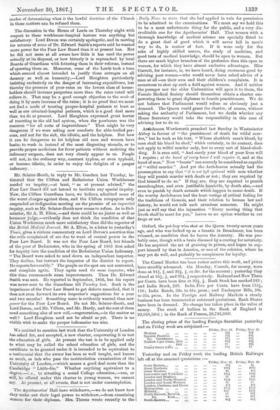Mr. Sclater-Booth, in reply to Mr. Goschen last Tuesday, in-
timated that the Clifton and Bedminster Union Workhouses needed no inquiry,—at least, " as at present advised," the Poor Law Board did not intend to institute any special inquiry. Now, the Clifton Guardians have, we believe; admitted some of the worst charges against them, and the Clifton ratepayers only suspended an indignation meeting on the promise of an impartial inquiry, such as Mr. Sclater-Booth now seems to refuse. As to Bed- minster, Sir A. H. Elton,—and there could be no juster as well as humaner judge,—evidently does not think the condition of that Union Workhouse much more satisfactory than did the reporter of the British Medical Journal. Sir A. Elton, in a letter to yesterday's Times, gives a curious commentary on Lord Devon's assertion that the evils complained of are due to want of central power in the Poor Law Board. It was not the Poor Law Board, but friends .of the poor of Bedminster, who in the spring of 1866 first asked for inquiry into the condition of the Bedminster Union Infirmary. 4‘ The Board were asked to send down an independent inspector. -They decline, but instruct the inspector of the district to report. He reports favourably." The people on the spot are not contented, and complain again. They again send the same inspector, who this time recommends some improvements. Then Dr. Edward .Smith was sent. He reported in September, 1866, but his report was never sent to the Guardians till Tuesday last. Such is the impatience of the Poor Law Board to get defects remedied, that it does not even forward its own inspector's suggestions for a year and two months ! Something more is evidently wanted than new yower for the Poor Law Board. Do not Mr. Sclater-Booth, and Lord Devon, and Mr. Villiers, and Mr. Hardy, and the rest of them need something also of new will,—regeneration,—in the matter as well? Lord Houghton need not be afraid as yet. There is no visible wish to make the pauper infirmaries too nice.


































 Previous page
Previous page